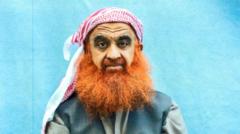The U.S. government has temporarily halted the guilty plea of Khalid Sheikh Mohammed, who is alleged to be the mastermind behind the 9/11 attacks. This development follows disputes over a pre-trial agreement the accused and his co-defendants reached last summer, where they would plead guilty to all charges in exchange for avoiding a death penalty trial.
The government argued in a recent filing with a federal appeals court that allowing these pleas could result in irreparable harm to both the government and the American public. As a result, a three-judge panel announced the necessity for additional time to evaluate the case, emphasizing that this delay should not be interpreted as a judgment on the merits of the case. The delay comes on the heels of previous rejections of Defense Secretary Lloyd Austin's attempt to revoke the plea agreements, which had been signed by a senior military official he designated.
The 9/11 attacks on September 11, 2001, resulted in the deaths of nearly 3,000 individuals when hijacked planes were flown into the World Trade Center and the Pentagon. In the aftermath, another plane went down in Pennsylvania due to passengers’ resistance. Mohammed and his co-defendants have been detained at Guantanamo Bay for over two decades, and the pre-trial hearings have stretched for more than ten years, with debates centering around potential evidence tainted by the torture these men endured while in CIA custody.
Khalid Sheikh Mohammed, in particular, faced severe interrogation tactics including waterboarding, and other 'advanced interrogation techniques' that have since raised ethical and legal concerns. Families of 9/11 victims have expressed mixed feelings towards the plea deals; some argue they are excessively lenient, while others view them as a path toward resolution given the protracted nature of the trials.
The announcement of the delay was met with disappointment by some family members of 9/11 victims, such as Tom Resta, who criticized the government for failing them once again. He remarked that the government had an opportunity to do the right thing regarding justice for 9/11 families but chose not to act.
Proponents of the plea agreement argued that it provides a chance for closure after more than 25 years of legal battles. Mohammed's legal team contended that the negotiations involved direct input from the White House over a span of two years.
In a court hearing held at Guantanamo Bay, Mohammed's lawyers confirmed his intention to plead guilty to the charges, and the next steps—if the plea is accepted—would involve appointing a military jury to conduct a public sentencing hearing. This process allows family members of the victims to deliver statements and pose inquiries directly to Mohammed, who would then be obligated to respond truthfully.
The case now awaits further examination by a federal appeals court prior to any potential indictment or acceptance of the plea, placing the decision in the hands of an incoming administration. The specific details regarding the deals struck with Mohammed and his co-defendants remain undisclosed to the public.



















